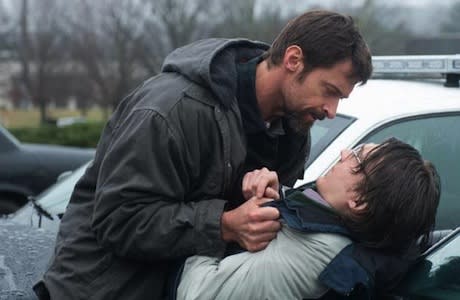When Prisoners opens, Keller Dover (Hugh Jackman), a devoted suburban father prone to emotional outbursts, is taking son Ralph (Dylan Minnette) hunting. After waiting patiently for some time, a deer steps into their sightline, allowing Ralph to make his first kill. Later, when Ralph is talking to his classmate and neighbour, Eliza (Zoe Borde), he justifies this action by reiterating his father's assertion that deer have too many fawns, which they're unable to feed, and therefore killing them helps ensure their overall survival. Eliza smirks, remarking, "Is that what he said?"
Amidst the casual family banter in the Dover house leading up to a traditional dinner party, Keller lets on that he's struggling to make ends meet, which is why the venison — some of which they take as a gift for Franklin (Terrence Howard) and Nancy Birch (Viola Davis)— is of the utmost importance to help them get by. Shortly thereafter, his younger daughter and the youngest Birch girl go missing, leaving everyone to assume that Alex (Paul Dano), the creepy, mentally handicapped neighbour that lurks in an RV, did something to them. The problem is: he's not talking and they can't find any proof that the girls were ever in his motorhome.
Once Detective Loki (Jake Gyllenhaal) enters the picture, placating the families while trying to extract information from Alex and his aunt, Holly (Melissa Leo), Prisoners begins to unfold as a muscular, highly intense and stylistically mature mystery thriller. That Keller Dover's rationale for killing the deer is slightly hypocritical considering his extreme (albeit logical) reaction to his missing daughter becomes the sticky thematic glue that adds challenging psychological and social commentary to what is already an excellent example of grounded, classicist filmmaking.
Quickly, the narrative splinters between the many characters, each of which has their own reactions to the situation. Keller focuses on laying blame, demanding that Loki find a way to keep Alex in jail even though they don't have any concrete evidence to hold him. Keller's wife, Grace (Maria Bello), shuts down completely, retreating to her bed, where she pops pills and perpetually sobs. Franklin and Nancy engage in search parties, trying to find the girls, hoping for the best, while Loki struggles with bureaucratic interference and secondary job responsibilities that distract him from the needs of his investigation.
If there is a flaw to Denis Villeneuve's assured, almost masterful foray into mainstream filmmaking, it's that the structure of the plot is so focused on the characters and their respective justifications for morally questionable behaviour that random subplots stand out, giving away too much far too early. There are still surprises at every turn and some extremely disturbing psychological ailments — presented with bracing honesty by Villeneuve — that make the viewing experience tense and thoroughly engrossing, but the plot winks a little too overtly.
Handled expertly though are the increasingly murky situations these people — prisoners of their emotions and solipsism — get themselves into. Loki, being wrapped up in rules and job profile, initially overlooks the most obvious suspect when a third party goes missing. Keller, unable to rely on others, decides to take the law into his hands, introducing violence and overt illegality into the lexicon of an otherwise judicious life. Worse is that he engages Franklin and Nancy, determined that his instincts and needs are paramount.
Everyone, being focused on reacting to situations, negates the needs and experience of others, exacerbating the situation and making matters worse for themselves. It's a bigger picture observation about humanity and how situations can spiral out of control when people are incapable of interpreting how their actions affect others. On occasion, their instincts are correct, but often it proves too late and is distorted by the many mistakes and missteps that will ultimately change their lives forever.
This thematic complexity stems, in part, from Villeneuve's care to explore the gritty specificity of each character, warts and all, as well as the full investment of the cast of actors, who each have very different and unique ways of coping with, and presenting, grief. Bello's wailing and Jackman's rage are tempered by Howard's meek despondency and Davis's wavering calmness and strength.
It's a fascinating tapestry of complex performances and assured, sly direction, making the basic mystery of it all — something that's mostly straightforward — carry far more weight and substance than most adult thrillers.
(Warner)Amidst the casual family banter in the Dover house leading up to a traditional dinner party, Keller lets on that he's struggling to make ends meet, which is why the venison — some of which they take as a gift for Franklin (Terrence Howard) and Nancy Birch (Viola Davis)— is of the utmost importance to help them get by. Shortly thereafter, his younger daughter and the youngest Birch girl go missing, leaving everyone to assume that Alex (Paul Dano), the creepy, mentally handicapped neighbour that lurks in an RV, did something to them. The problem is: he's not talking and they can't find any proof that the girls were ever in his motorhome.
Once Detective Loki (Jake Gyllenhaal) enters the picture, placating the families while trying to extract information from Alex and his aunt, Holly (Melissa Leo), Prisoners begins to unfold as a muscular, highly intense and stylistically mature mystery thriller. That Keller Dover's rationale for killing the deer is slightly hypocritical considering his extreme (albeit logical) reaction to his missing daughter becomes the sticky thematic glue that adds challenging psychological and social commentary to what is already an excellent example of grounded, classicist filmmaking.
Quickly, the narrative splinters between the many characters, each of which has their own reactions to the situation. Keller focuses on laying blame, demanding that Loki find a way to keep Alex in jail even though they don't have any concrete evidence to hold him. Keller's wife, Grace (Maria Bello), shuts down completely, retreating to her bed, where she pops pills and perpetually sobs. Franklin and Nancy engage in search parties, trying to find the girls, hoping for the best, while Loki struggles with bureaucratic interference and secondary job responsibilities that distract him from the needs of his investigation.
If there is a flaw to Denis Villeneuve's assured, almost masterful foray into mainstream filmmaking, it's that the structure of the plot is so focused on the characters and their respective justifications for morally questionable behaviour that random subplots stand out, giving away too much far too early. There are still surprises at every turn and some extremely disturbing psychological ailments — presented with bracing honesty by Villeneuve — that make the viewing experience tense and thoroughly engrossing, but the plot winks a little too overtly.
Handled expertly though are the increasingly murky situations these people — prisoners of their emotions and solipsism — get themselves into. Loki, being wrapped up in rules and job profile, initially overlooks the most obvious suspect when a third party goes missing. Keller, unable to rely on others, decides to take the law into his hands, introducing violence and overt illegality into the lexicon of an otherwise judicious life. Worse is that he engages Franklin and Nancy, determined that his instincts and needs are paramount.
Everyone, being focused on reacting to situations, negates the needs and experience of others, exacerbating the situation and making matters worse for themselves. It's a bigger picture observation about humanity and how situations can spiral out of control when people are incapable of interpreting how their actions affect others. On occasion, their instincts are correct, but often it proves too late and is distorted by the many mistakes and missteps that will ultimately change their lives forever.
This thematic complexity stems, in part, from Villeneuve's care to explore the gritty specificity of each character, warts and all, as well as the full investment of the cast of actors, who each have very different and unique ways of coping with, and presenting, grief. Bello's wailing and Jackman's rage are tempered by Howard's meek despondency and Davis's wavering calmness and strength.
It's a fascinating tapestry of complex performances and assured, sly direction, making the basic mystery of it all — something that's mostly straightforward — carry far more weight and substance than most adult thrillers.




